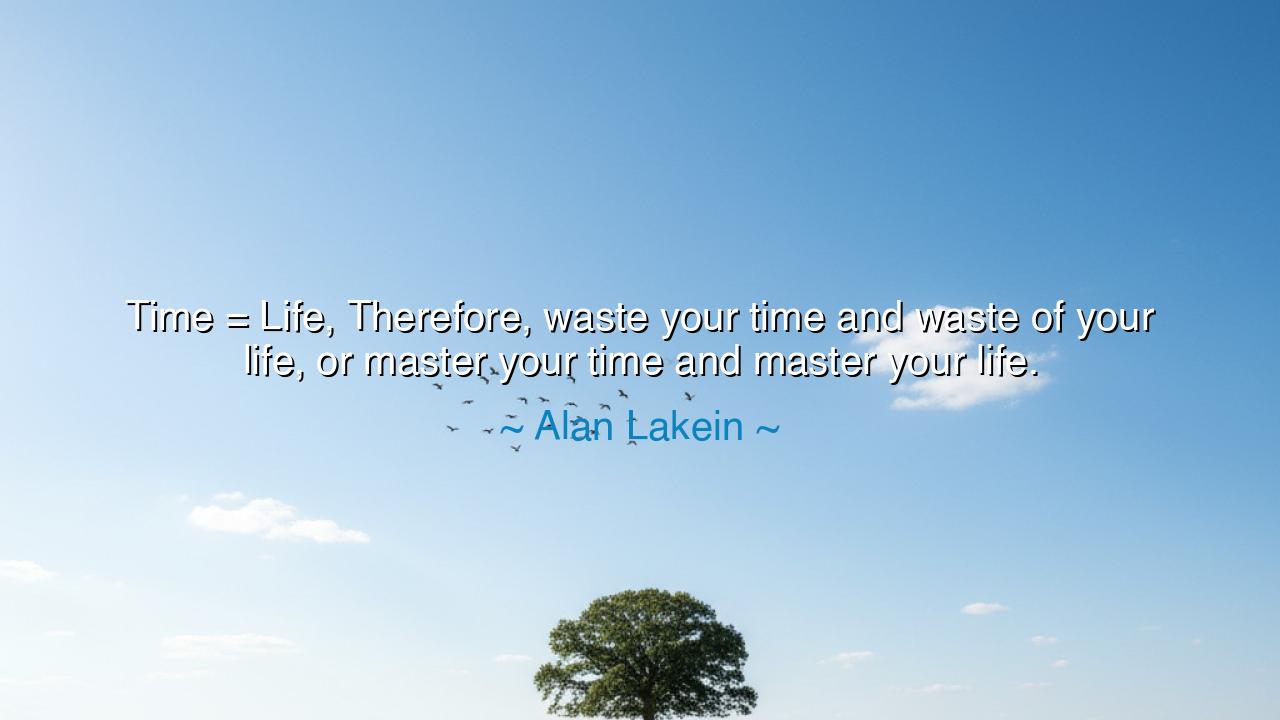
Time = Life, Therefore, waste your time and waste of your life
Time = Life, Therefore, waste your time and waste of your life, or master your time and master your life.






Alan Lakein, the master of time management, spoke with clarity and force when he declared: “Time = Life, Therefore, waste your time and waste of your life, or master your time and master your life.” In this bold equation, he revealed a truth as sharp as the edge of a blade—that time and life are not separate but one. Every breath, every heartbeat, every passing hour is a portion of life itself. To squander time is to squander the very substance of existence; to master time is to take command of destiny. His words are both warning and promise: you hold in your hands the key to waste or mastery, ruin or greatness.
The origin of this teaching lies in Lakein’s work as a pioneer of modern time management. At a time when the pace of the world was quickening, and men and women felt the crushing weight of busyness without direction, Lakein sought to provide not merely techniques but wisdom. His statement transforms time management from a tool of efficiency into a philosophy of living. He reminds us that minutes and hours are not trivial—they are life itself, disguised in smaller pieces. To misuse them is to lose life; to order them with purpose is to rise above the chaos.
History offers us vivid examples. Consider Leonardo da Vinci, whose genius stretched across painting, engineering, anatomy, and invention. Yet even he, despite his brilliance, left many works unfinished because of scattered focus. His time, though rich in output, was not always mastered, and the world lost many wonders that might have been. Contrast this with the life of Benjamin Franklin, who carefully ordered his days with discipline, dividing hours into learning, service, and reflection. By mastering his time, Franklin mastered his life, leaving behind inventions, writings, and a legacy that still endures.
The lesson is also reflected in the downfall of empires. The Roman Empire, at its height, wasted decades in decadence and luxury, neglecting discipline and purpose. Their misuse of time led to weakness, and weakness to collapse. Meanwhile, smaller nations, more vigilant in their use of hours and efforts, rose to prominence. Time is the great equalizer; it gives the same twenty-four hours to emperor and peasant alike. What distinguishes them is not the gift, but the mastery of it.
The deeper meaning of Lakein’s words is that time is both treasure and tyrant. Left uncontrolled, it flees from you, carrying away your dreams and possibilities. But when grasped firmly, it becomes a servant, bending itself to your will, allowing you to shape a life of meaning. The choice is stark: either be the victim of wasted hours or the master of purposeful days. In this, every man must decide whether to drift or to command.
The lesson is clear: guard your time as you would guard your very soul. Let not idle distraction steal it away. Do not confuse busyness with mastery; rather, devote your hours to what uplifts, strengthens, and endures. If each day is a coin of life, spend it wisely on pursuits worthy of your spirit. Do not leave tomorrow’s work undone, for tomorrow is not promised.
Practically, this means living with discipline and awareness. Rise with purpose, and order your hours with intention. Write down what matters most, and let your time serve these ends, not be scattered by the trivial. Learn to say no to what wastes your strength, and yes to what fulfills your calling. Treat each hour as sacred, for it is a fragment of your very life.
So remember, children of tomorrow: time equals life. Waste your time, and you waste your life; master your time, and you master your life. The sands slip swiftly through the glass, but in your hands lies the power to shape them. Be not a slave to the hours—be their master, and in so doing, become the master of your destiny.






AAdministratorAdministrator
Welcome, honored guests. Please leave a comment, we will respond soon